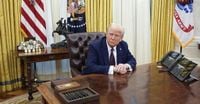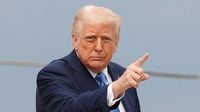In a bold move, US President Donald Trump has threatened Russian President Vladimir Putin with hefty tariffs on Russian oil if he does not facilitate peace negotiations with Ukraine. During an interview on NBC, Trump expressed his frustration over Putin's recent remarks questioning the credibility of Ukrainian President Volodymyr Zelensky, suggesting that he could be replaced by a temporary leader. Trump stated, "If Russia and I can't come to an agreement to stop the bloodshed in Ukraine, and if I think it was Russia's fault, which it might not be, I will impose secondary tariffs on oil, on all oil coming out of Russia." He emphasized that this would mean that anyone buying oil from Russia would be barred from doing business in the United States.
Trump's comments come as he prepares to speak with Putin by phone this week, highlighting the escalating tensions surrounding the conflict in Ukraine. The proposed tariffs, which could range from 25% to 50%, represent a significant escalation in Trump's diplomatic approach, aiming to pressure Russia into compliance.
In a related development, Trump has also revoked the export permits for Venezuelan oil and its derivatives, affecting foreign partners of the state oil company PDVSA, including Spain's Repsol, Italy's Eni, France's Maurel & Prom, and India's Reliance Industries. This measure, which terminates licenses granted during the Biden administration, is part of Trump's broader strategy to impose economic sanctions on Venezuela and its controversial leader, Nicolás Maduro.
According to reports, many of the affected companies had already suspended oil imports from Venezuela following the announcement of new tariffs on buyers of Venezuelan oil and gas, which are set to take effect on April 2, 2025. The sanctions come amid ongoing concerns about Maduro's legitimacy, as he was sworn in for a third term in January despite allegations of election fraud. Over 7.7 million Venezuelans are believed to have fled the country during Maduro's presidency, adding to the humanitarian crisis in the region.
Trump's administration has maintained a hardline stance on Venezuela, which has been a consistent theme since he returned to the White House. He has previously claimed that the Venezuelan government has sent criminals, including members of the violent 'Tren de Aragua' gang, into the United States. Although no evidence has been presented to support these claims, they have influenced Trump's immigration policies and rhetoric.
In a notable escalation, the White House recently called for the Supreme Court to permit the government to deport immigrants under the Alien Enemies Act, following a federal court ruling that blocked efforts to remove a group of Venezuelans allegedly linked to criminal activities. This move reflects Trump's ongoing efforts to tighten immigration controls and address what he perceives as threats posed by individuals coming from Venezuela.
As Trump navigates these complex geopolitical waters, his administration's approach to Venezuela and Russia continues to draw attention. The revocation of oil export permits and the imposition of tariffs are part of a larger strategy to exert pressure on regimes that the US government views as hostile.
Trump's actions have raised concerns among international observers, who question the potential impacts on global oil markets and diplomatic relations. The decision to revoke permits for foreign oil companies operating in Venezuela could lead to further isolation of the Maduro regime, but it also risks escalating tensions with countries that have vested interests in Venezuelan oil.
Repsol, which has been operating in Venezuela since 1993, has expressed concerns about the uncertainty generated by the change in US administration. The company had previously signed agreements with PDVSA to manage its Petroquiriquire joint venture, aiming to increase production and recover debts linked to its operations. However, the recent sanctions have thrown these plans into disarray.
As the situation develops, the implications of Trump's tariffs on Russian oil and the revocation of Venezuelan oil permits will likely be closely monitored by both domestic and international stakeholders. With the potential for significant economic repercussions, the coming weeks may prove crucial in determining the future of US foreign policy in these regions.
In conclusion, Trump's aggressive stance towards both Russia and Venezuela marks a continuation of his administration's confrontational approach to foreign policy. As he seeks to navigate these complex international challenges, the impact of his decisions on global diplomacy and trade remains to be seen.





